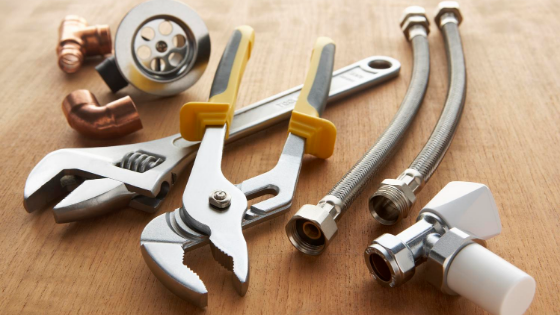Plumbing Maintenance for Fall

The fall season brings memories of brilliant, lush colors, and cool, comfortable temperatures. It is a period of reprieve after the intense heat of summer and before the winter’s frigid cold rolls in. However, as the leaves start to fall and the heat of the summer dissipates, homeowners everywhere should be aware of how the cold of winter will affect them. The sudden drop in temperature will wreak havoc on their plumbing, especially if they are unprepared.
Although a lot of us take it for granted, plumbing plays a crucial role in modern society. It allows us to properly dispose of waste material and keep our homes clean and sanitary. That’s why plumbing maintenance is important in the weeks leading up to the winter. The prolonged cold weather can be extremely hard on your plumbing fixtures, especially if you aren’t prepared.
If you’ve neglected regular plumbing maintenance and didn’t address minor issues throughout the year, they will most likely be compounded in the winter months. At Turek’s Plumbing Services, we are committed to keeping your plumbing in top shape all year round. But before we look at some of the ways you can prepare your plumbing for the winter, let’s discuss what the cold does to your pipes.
How Cold Weather Causes Plumbing Problems
Winter temperatures in the U.S. usually average just above freezing at 33.2 degrees Fahrenheit, but they can hit lows of 2.6 F in places like Alaska. When the temperature dips below 32 degrees Fahrenheit, the chances of exposed pipes or poorly insulated pipes in garages, basements, and crawl spaces freezing increase exponentially. And whether it’s clean water or waste material flowing through those pipes, you definitely don’t want them to burst, especially during the winter.
A burst pipe will cause water damage, requiring thousands of dollars’ worth of repairs, and it creates the perfect environment for mold and mildew to grow. What’s more, burst pipes aren’t always conspicuous, and it may be long before you actually discover it, and this may weaken structures and possibly lead to health problems. That’s why plumbers in Appleton, Wisconsin, recommend you regularly inspect pipes you suspect are at risk of freezing, especially exposed or cracked pipes in exterior walls, attics, and basements.
If there isn’t any water coming out of the faucet or it only trickles at low pressure, one of your pipes may be frozen. Also be on the lookout for:
- Frost, on the pipe, especially those that can be seen and the ones under the sink.
- Strange or odd smells from a faucet or drain
If you can find the spot where a pipe is frozen, you can thaw it out by applying heat on the frozen section of the pipe. Try wrapping an electronic heating pad, heat the area with a hairdryer, or use towels soaked in hot water. However, don’t use a blowtorch, kerosene heaters, a charcoal stove, or any other open flame device as they represent a severe fire hazard. If this doesn’t work, contact a plumber in Appleton, Wisconsin. Now let’s look at some plumber approved tips on plumbing maintenance as the winter approaches.
Plumbing Maintenance Tips for the Fall
Your plumbing fixtures will be especially vulnerable as the temperature drops. Here’s what you can do:
- For outdoor hoses, the water inside them can freeze and expand in cold temperatures. This expansion will cause them and any connected pipes in the house to freeze and break. Disconnect the water hoses, drain them of any remaining water, and store them in a dry area to prevent this.
- Outdoor faucets that leak or drip can lead to water damage and severe plumbing issues in the winter. Make sure the faucets are fixed during the fall, and once the outdoor hoses are disconnected, cover and insulate the faucets with a Styrofoam insulation kit.
- If your house has an interior shut off valve that is connected to the outside faucets and plumbing, Orange County plumbers recommend shutting it off and opening the outdoor faucet valve. This will ensure that there is no remaining water in the line that could freeze during the winter.
- Make sure you insulate any pipes in non-heated areas like the crawl space or the garage. This will prevent them from freezing.
- At the spot where a pipe enters your home, gaps can easily develop between the pipe and the wall over time. Cold air can enter through these gaps. Gilmore Heating & Air, a heating and cooling company in Placerville, says HVAC systems work a lot harder and even freeze the pipes. Seal any gaps you find with weather stripping, caulking, and insulation.
- Your water heater will be working a lot harder in the winter months, so make sure you completely flush it in the fall. This will remove the sediment buildup, which blocks proper heat transfer, ensuring the water heater runs more efficiently in the winter months.
- Additionally, make sure your sump pump is properly cleaned and insulated. This will ensure it doesn’t freeze in the cold temperatures. Appleton plumbing maintenance professionals can help if this task is difficult for you.
Take advantage of the fall to winter-proof your plumbing. Integrating these tips into your plumbing maintenance routines will make sure your plumbing operates efficiently during the coming winter months. At Turek’s Plumbing Services, we are committed to keeping your plumbing in good shape all year round. Contact us for your bathroom renovation, pipe repair, pipelining, sewer pipe repair, and trenchless pipe repair needs in Appleton Wisconsin today.


 Why Choose a Tankless Water Heater
Why Choose a Tankless Water Heater The Best Time to Remodel Your Bathroom
The Best Time to Remodel Your Bathroom